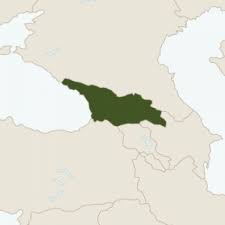
NDI
The leader of Georgia’s ruling party said Monday that the ex-Soviet nation will hold the next parliamentary election based entirely on a proportionate system, fulfilling a key demand of anti-government protesters, AP’s
Bidzina Ivanishvili, in his first public appearance since the crisis erupted, said Georgian Dream has agreed to change the election law earlier than planned and to hold next year’s parliamentary election based on a fully proportional system.
Georgia is an angry democracy. A recent Gallup survey found that 27 percent of Georgians said they felt angry “yesterday.” That was more than enough to bring large numbers of protestors out onto Rustaveli Avenue, Tbilisi’s traditional arena of protest on the night of June 20, notes Thomas de Waal,
It is unfortunate that, despite having built democratic institutions, Georgia is still resolving its disputes in this way, he writes for The Moscow Times. A decade ago, the Georgian author Guram Odisharia wrote, “Without the emergence of a new political culture, without a harmonic relationship between the authorities and society, the people’s hopes will always be deceived and the main player in our country’s political history will be Rustaveli Avenue and not Georgian politicians.” The same unfortunate scenario played out again in Tbilisi in the last two days, he contends in an article originally posted by Carnegie Russia Center.
The proposed reforms are a “huge achievement for Georgian democracy” and would result in a “much more pluralistic and fair” electoral system, said Tornike Sharashenidze. of the Georgian Institute of Public Affairs.
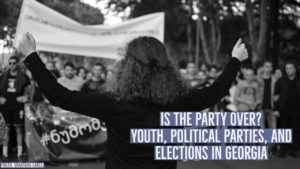 In the current system, only half of parliament seats are allocated proportionally. Citizens vote for a party list in their district as well as candidates for single-mandate seats that are typically won by the ruling party, he told the Telegraph.
In the current system, only half of parliament seats are allocated proportionally. Citizens vote for a party list in their district as well as candidates for single-mandate seats that are typically won by the ruling party, he told the Telegraph.
“The small towns in the districts are dominated by local kingpins and businessmen, all of whom want to be on good terms with the ruling party,” he said. “So they make a deal, ‘I’ll run here on my own money’. They run for (majoritarian seats in) parliament for the ruling party and win elections.”
 Organizers applaud the ruling party’s concession to hold 2020 parliamentary elections fully proportional as “a historic victory,” adds civil.ge, a partner of the National Endowment for Democracy. However, they say the rest of their demands still need to be addressed, including the resignation of Interior Minister Giorgi Gakharia, as well as the release of those protesters who were detained on June 20 and detention of those law enforcers who exceeded their duties.
Organizers applaud the ruling party’s concession to hold 2020 parliamentary elections fully proportional as “a historic victory,” adds civil.ge, a partner of the National Endowment for Democracy. However, they say the rest of their demands still need to be addressed, including the resignation of Interior Minister Giorgi Gakharia, as well as the release of those protesters who were detained on June 20 and detention of those law enforcers who exceeded their duties.
The demonstrations reflect increasing anger and frustration with the ruling party Georgian Dream and, more broadly, the political elite. Georgians want accountability rather than revolutionary change, observers suggest.
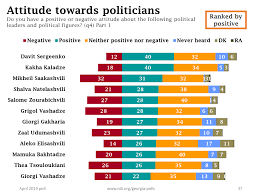 Thousands of anti-government protesters gathered outside the country’s parliament building for the fourth straight day on Sunday, and over 240 people have been injured in clashes with police. The protests began after a Russian delegation appeared in parliament. But they are calling for broader change, Amy Mackinnon reports for Foreign Policy.
Thousands of anti-government protesters gathered outside the country’s parliament building for the fourth straight day on Sunday, and over 240 people have been injured in clashes with police. The protests began after a Russian delegation appeared in parliament. But they are calling for broader change, Amy Mackinnon reports for Foreign Policy.
The anger is not all about Russia, however, says Carnegie’s de Waal. The Georgian Dream government is increasingly unpopular with large segments of the population. The urban professional classes in Tbilisi resent the shadowy unaccountable figures who are running the country from behind the scenes.
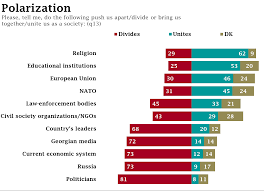
NDI
The leader of Georgia’s opposition Republican Party, Levan Berdzenishvili, told AFP that the appearance of a Russian MP in parliament’s plenary chamber “was the last straw for Georgians, long frustrated over Ivanishvili’s dysfunctional government and the backsliding of the country’s democracy.”
“Ordinary Georgians and political parties are united in their resolve to get rid of oligarchic rule,” the veteran politician added.
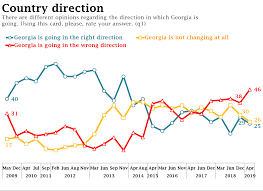 Georgians’ perceptions of their country’s direction is at its lowest since 2010, with 46 percent saying that the country is moving in the wrong direction, according to recent National Democratic Institute public opinion research, (above), conducted in partnership with the Caucasus Research Resource Center (CRRC). Conducted in April 2019, the poll found that a majority of the population (56 percent) believes that the government is performing badly and the performance of the country’s top leaders (prime minister, president, and speaker of parliament) has declined sharply over the past three years. Politicians at large (81 percent) and the country’s leaders in particular (68 percent) are dividing their country and pushing people apart. Support for political parties remains low, adds NDI, a partner of the National Endowment for Democracy.
Georgians’ perceptions of their country’s direction is at its lowest since 2010, with 46 percent saying that the country is moving in the wrong direction, according to recent National Democratic Institute public opinion research, (above), conducted in partnership with the Caucasus Research Resource Center (CRRC). Conducted in April 2019, the poll found that a majority of the population (56 percent) believes that the government is performing badly and the performance of the country’s top leaders (prime minister, president, and speaker of parliament) has declined sharply over the past three years. Politicians at large (81 percent) and the country’s leaders in particular (68 percent) are dividing their country and pushing people apart. Support for political parties remains low, adds NDI, a partner of the National Endowment for Democracy.







